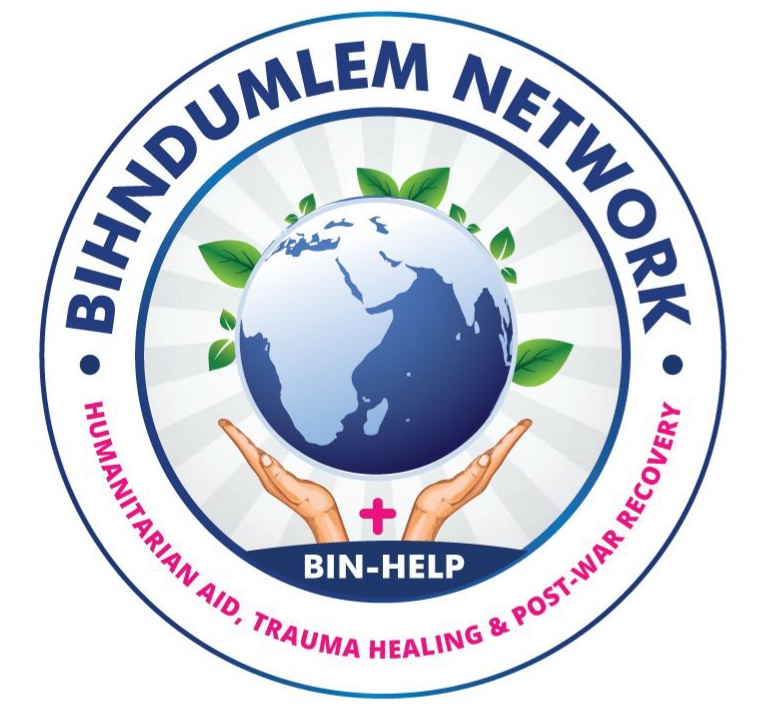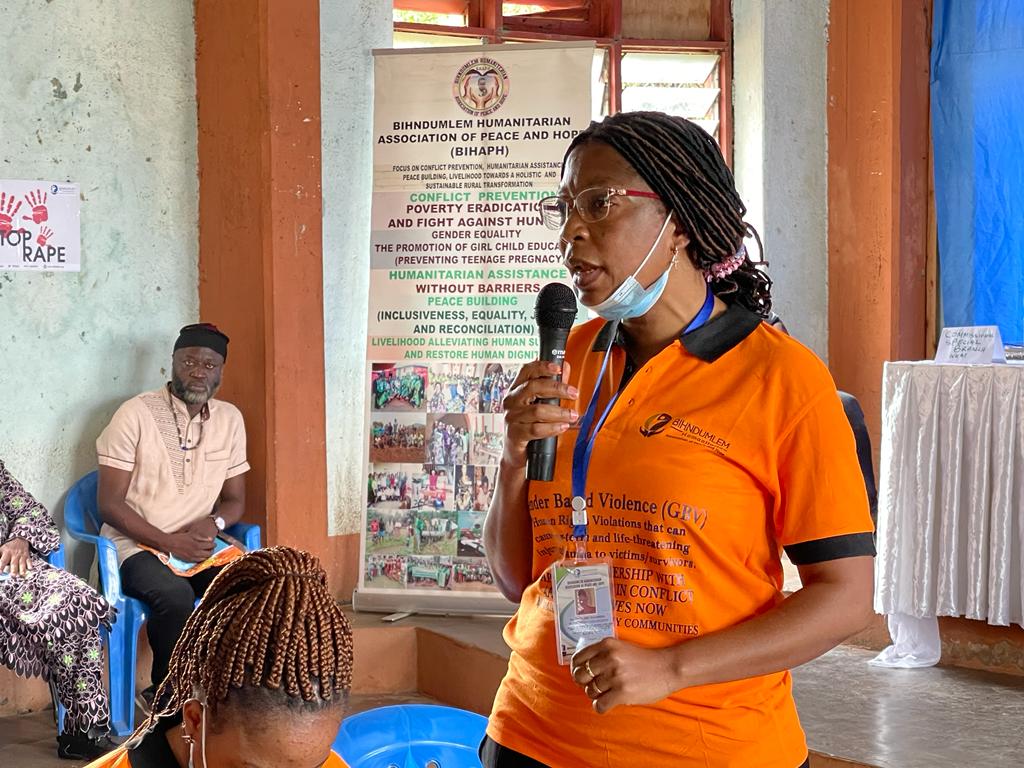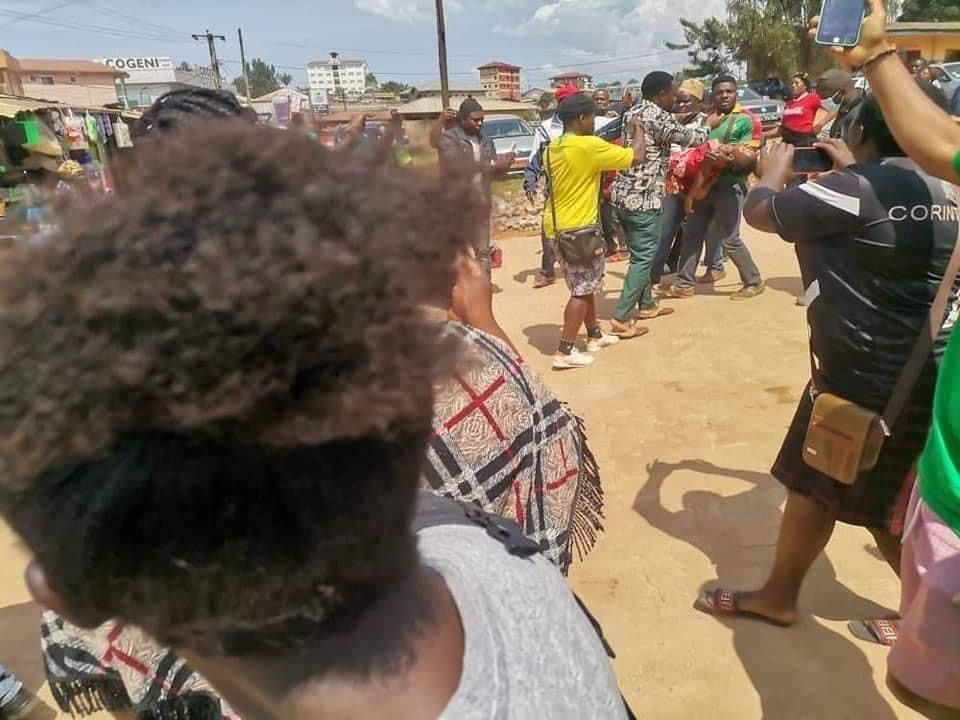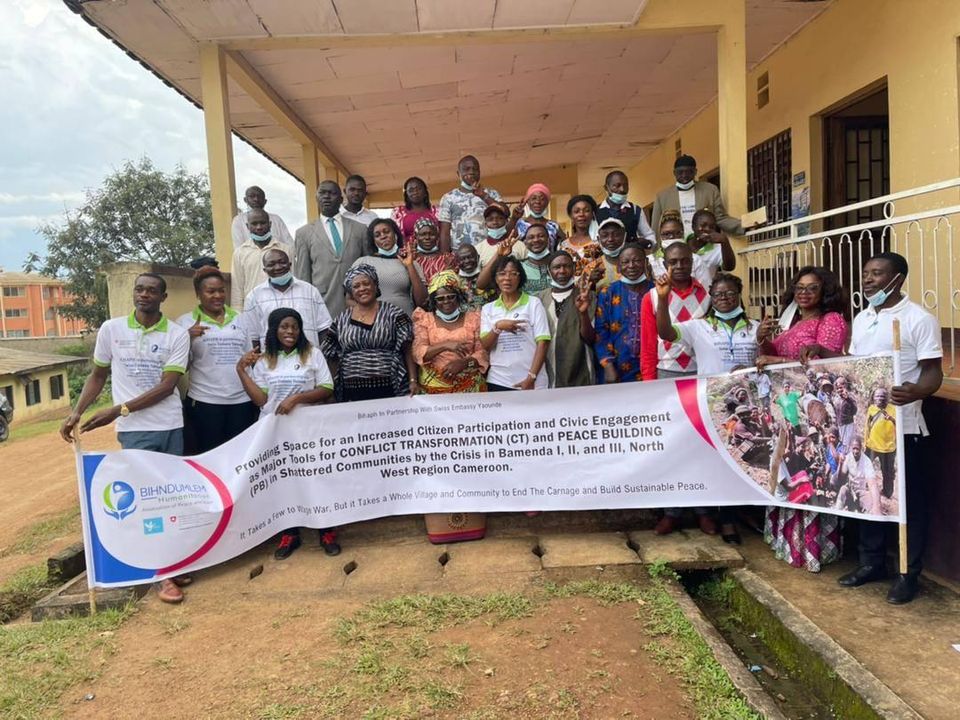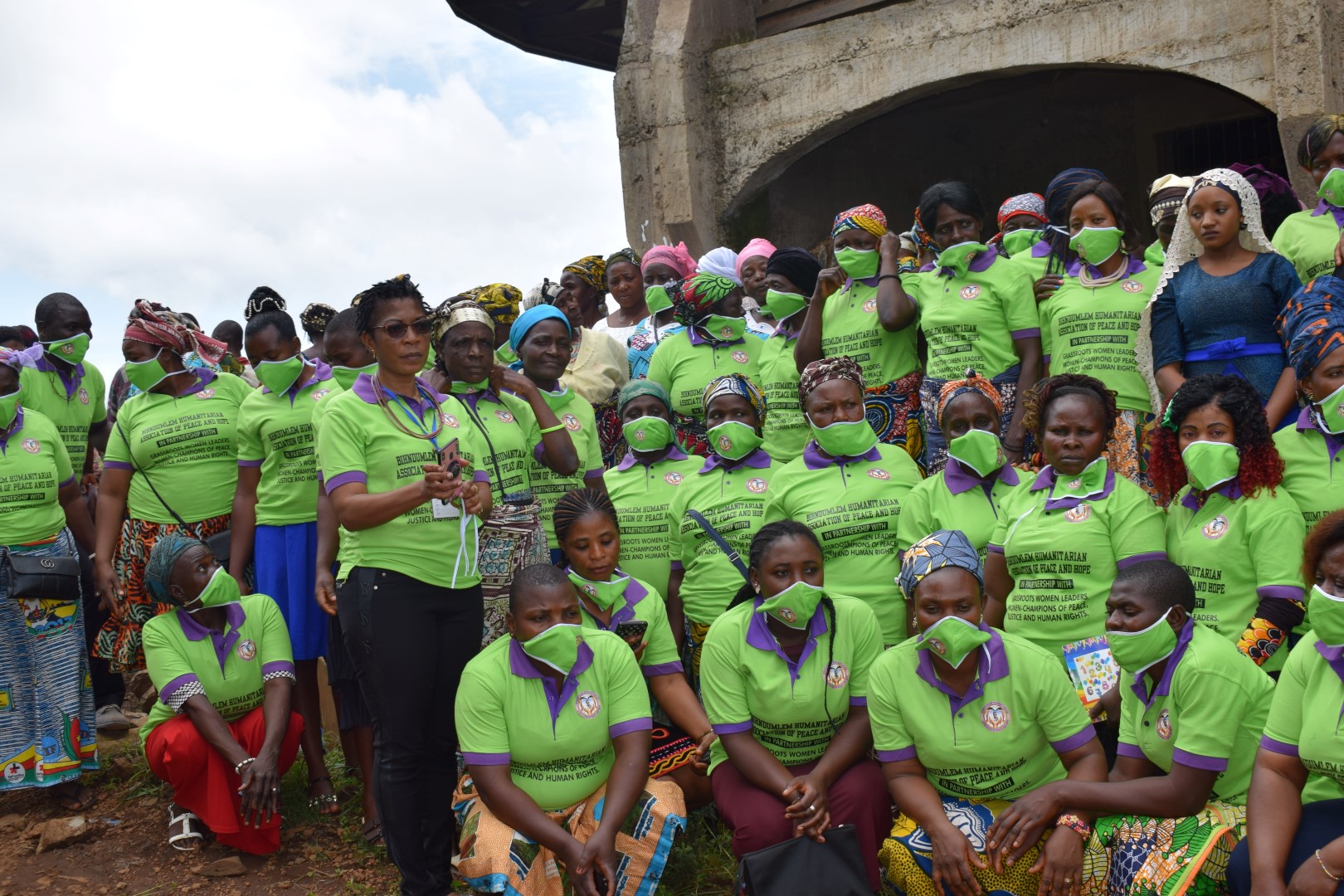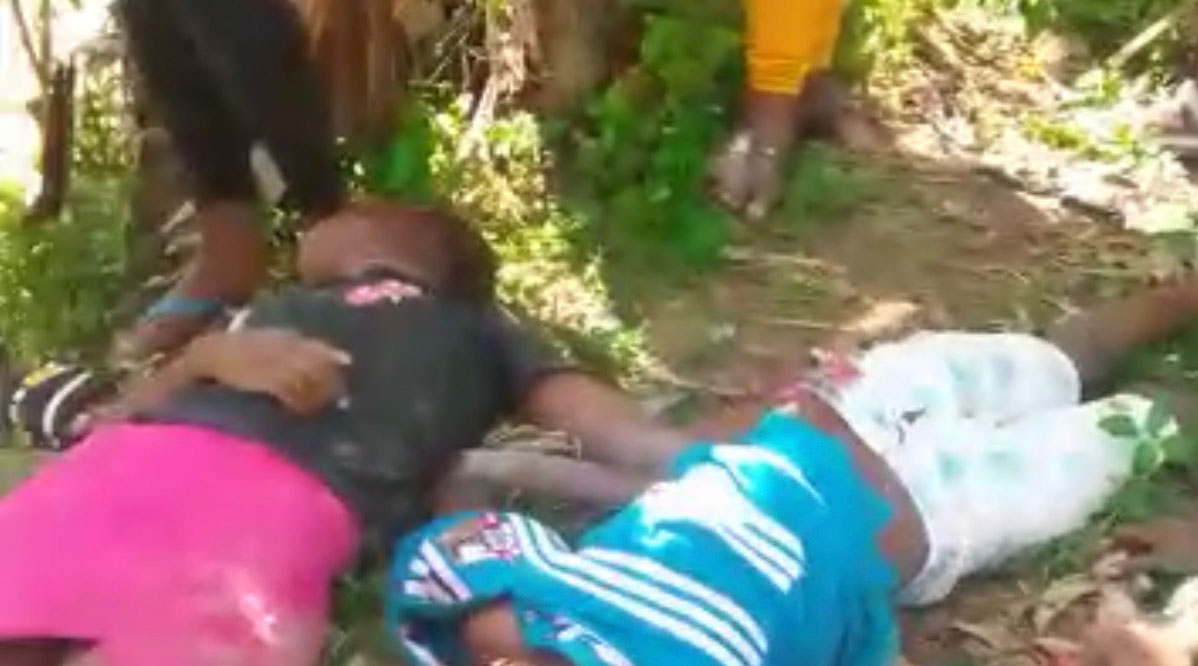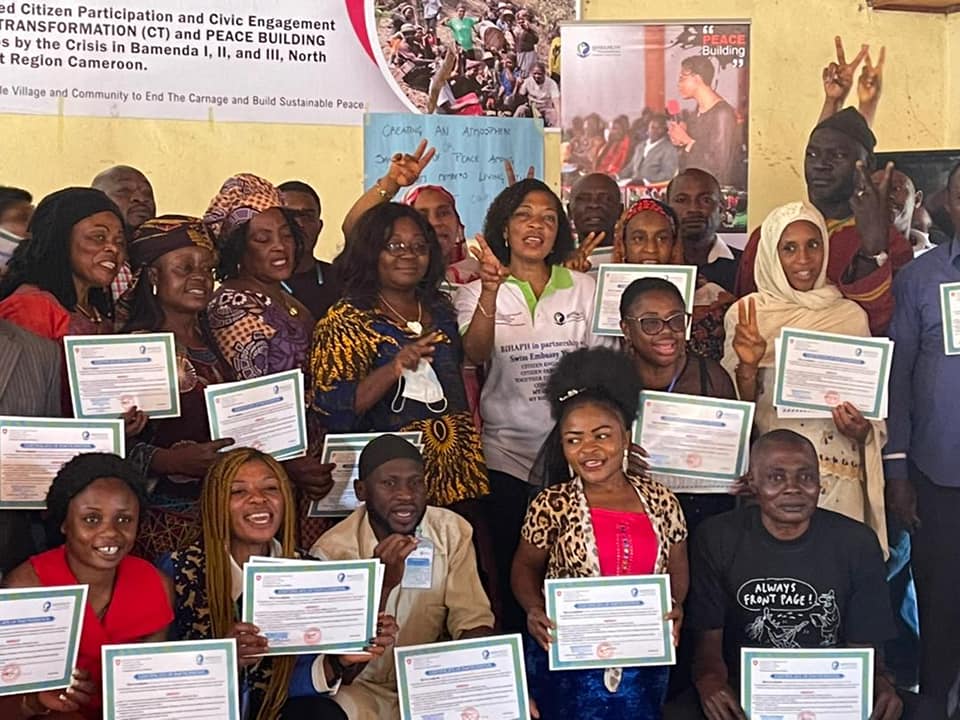 “Let’s work hand in gloves towards the realization of peace in our communities and Regions. Women, men, Youths, NSAG or military Children, as a community let us all come together and build peace and rebuild our shattered communities.
“Let’s work hand in gloves towards the realization of peace in our communities and Regions. Women, men, Youths, NSAG or military Children, as a community let us all come together and build peace and rebuild our shattered communities.
UNITED NATION HIGH COMMISSIONER FOR REFUGEES(UNHCR) TAKES GIANT STEPS WITH LOCAL NGO BIHNDUMLEM HUMANITARIAN ASSOCIATION OF PEACE AND HOPE (BIHAPH) TO COMBAT GENDER BASED VIOLENCE IN THREE COMMUNITIES IN MENCHUN DIVISION -WUM CENTRAL, BAFMEN AND BENAKUMA
UNHCR/BIHAPH PROJECT ON STRENGTHENING COMMUNITY RESPONSE AGAINST GENDER BASED VIOLENCE AND PREVENTION OF SEXUAL ABUSE IN WUM CENTRAL, BAFMEN AND BENAKUMA IN MENCHUM DIVISION
Bihndumlem Humanitarian Association of Peace and Hope (BIHAPH) is presently implementing a project on the theme; Strengthening Community Response Against Gender Based Violence and Prevention of Sexual Abuse in some communities in Menchum Division, Wum Central, Bafmeng and Benakuma respectively. The six months’ project which began on the 1st of June, will end on November 30th, 2021. The giant project sponsored by United Nations High Commissioner for Refugees (UNHCR), has come to save the lives of Internally Displaced Persons (IDPs), returnees and the host communities from the misfortunes of war. According to the CEO Madame Bibiana, “the Anglophone crisis has brought untold agony to the people of the North West and South West regions. It has also increased gender based violence(GBV) and sexual exploitation and abuse(SEA), since rape is seen as a weapon of war. Our women and men especially the girls are victims of this pain. So, amid the challenges of war UNHCR in partnership with BIHAPH is implementing this project so as to save the lives of the suffering population in the three communities. We, may not be able to change the lives of everybody, but if we save the life of one person, we will be satisfied”.
TRAININGS CARRIED OUT IN THE THREE COMMUNITIES
The project began effectively in July after the training of the stakeholders in the three communities. In June, in all three communities, the ground work was laid by the staff and the community mobilizers. But the project went into full swing during the training of the stakeholders in all three communities. The facilitators, including the G.C of CAWOPEM madam Carine Ndasah drilled the participants on;
- An introduction to gender based violence, contextualizing the concept
- Shifting cultural norms to address gender based violence
- Legal framework on GBV, causes, forms, consequences and prevention
- The psychological effects of GBV in vulnerable communities.
- The impact of GBV on children: The community's role to fight against GBV involving boys and girls.
- Gender based violence using communication approaches to alleviate the vice.
- Economic empowerment as a strategy to fight GBV and PSEA
The impact of this training was seen immediately during one of the sessions as Chief Pascal the Sub chief of Benahundu confessed, “this training has changed my mindset, from what I have learnt here today, I promise never to beat my wife again. I have made up my mind to educate all my children both boys and girls. I won’t treat the girls as properties any longer”, two months later he is still practicing what he confessed and calling for more trainings in his community.
The training of Journalist, Local Broadcasters, Opinion Leaders and Town Criers.
After, the training of the stakeholders came the training for communicators. This is due to the fact that over the years it has been discovered that communicators have unwittly increased the pain of survivors, and during humanitarian crisis, ‘people need the right information like they need water’. UNHCR and her partner deemed it necessary to train this group of persons on the ethics of reporting GBV cases. The facilitator Ms. Nfor Brenda Baki made the training as interactive as possible, so as to get her message across to the participants.
Furthermore, members of Community Based Organizations (CBOs), Alert Team and Cultural Groups were also trained. According to the M&E “the project cannot be successful if CBOs are not trained on what the cankerworm is and how it can be alleviated by the community”. The training had as objectives to drill the participants on; the rights of survivors, effective methods of communicating GBV issues and the role of humanitarian workers in fighting GBV. It is important to note that the absence of the above mentioned in our Community Based Organizations has made it difficult for the vice to be alleviated, so training the participants on these issues was of great necessity.
SENSITIZATIONS
For awareness raising and community education, there have been continues sensitization campaigns throughout the three communities. The staff and community mobilizers have left no stone unturned, they have carried out sensitization campaigns: at the markets, motor parks, in churches, mosques, social groups, religious groups, cultural groups, villages and palaces. Drilling the people on the legal consequences of GBV, psychological effects of GBV on the survivors. And also teaching them on the need to communicate effectively at home, at their meeting places, churches and market places about some of these acts that are detrimental to the wellbeing of the community and their families.
The media has also served as a great tool of sensitization and community education. The people are educated weekly on what the law says about GBV, the psychosocial effects and ways of effective communication. The radio spots are being transmitted in three languages; English, Aghem the native language of the Wum people and Fulfulde for the Mbororo community, making everyone in the community a part of the project. Despite the sensitizations, the people want more; “thank you so much for coming to Aghem Teachers Association (ATA) to sensitize the teachers, but I wish to plead with you, to come to my school and educate the pupils on the effects of forced and early marriages, a form of GBV that is prevalent in my community”, a Head Teacher of a primary in one of the villages pleads with the team.
SERVICES OFFERED BY THE PROJECT
100 survivors are being economically empowered in; hair dressing, dress marking and tailoring. An activity that has been seen by survivors as silver lining in a dark cloud, “I thank Allah for this project. Thank you UNHCR and BIHAPH for this life changing opportunity”, a trainee said. The services of the legal adviser and the psychosocial counsellor, are also at the disposal of the people especially the IDPs in all three communities.
BIHAPH'S OUTCRY ON THE KILLING OF BABY BRANDY TATAW IN BAMENDA
The outright killings and irresponsible use of guns on innocent civilians and children is becoming a pain in the heart, adding to the suffering of a people already experiencing excruciating pain within the context of the Anglophone crisis . Not up to a month that the whole world was morning because little Caro in Buea was brutally shot amd killed, it is now the turn of Tataw Brandy in Bamenda who on November 12 breath her last as a result of a gun fired at her by a military officer who is supposed to protect her. The young girl of about 7 we are told was on her way back from school when the unfortunate incident happened.
BIHNDUMLEM Humanitarian Association of Peace and Hope (BIHAPH) condemns in strong terms this violence and abuse of human rights perpetrated on innocent civilians, children inclusive noting that this continous act of violence is only going to harden the hearts of warring parties and the armless civilians end up suffering the brunt of this war more than anyone else. We extend our sincere and heart felt condolences to the berieved family.
BIHAPH is calling on the powers that be to stand up for the rights of innocent civilians and all who have lost their lives in the most gruesome way. It was our cry last month that such an incident does Not repeat itself but History has just repeated itself. Again this is not the first but this could be the last if we all stand up as one people, to say NO TO GUN VIOLENCE ! NO TO SENSELESS KILLING OF HUMAN BEINGS AND YES TO THE RESPECT OF HUMAN LIFE.
Cameroon use to be a land of promise and a land of glory suddenly, it has become a land flowing with human blood. In this light, BIHAPH is calling for an unconditional cease fire in the two English speaking regions of Cameroon. This continueous shootings and killings is only worsening the fight of which many are tired of.
#stopthekillings#
#stopthegunshots#
#weneedpeace#
#Peaceispossible
BUILDING PEACE THROUGH THE DAILY EXPERIENCES OF ORDINARY PEOPLE IN CONFLICT AFFECTED COMMUNITIES IN BAMENDA 11
CAMEROON ANGLOPHONE CRISIS: ESCALATING INTO A FULL BLOODY COMMUNITY INSURGENCY“ The War Within a War”
On June 6th, 2019, the Anglophone Crisis took a violent turn when non state armed groups (NSAG) attacked the minority Mbororo-Fulani communities in Upkwa and Kecha. Tensions between the Mbororo and the NSGA were already strained, but that day saw the tension degenerate into outright violence.
“ARE WE GETTING WORSE OR BETTER” BIHAPH JANUARY REPORT ON VIOLENCE AND HUMAN RIGHTS VIOLATIONS IN ANGLOPHONE CAMEROON.
Latest report on the Anglophone crisis states that there has been escalation in violence marked by indiscriminate killings and mass displacement of persons in the two English speaking regions. Both Security forces and separatist fighters have destroyed villages, tortured many including minors to extract “confessions”. Armed separatists are reported to have also attacked schools, killed security forces members and kidnapped so many and demanding for ransom. Life is at it worse in the two affected regions with the population gripping with fear, uncertainties and a frightful future.
BIHAPH LOOKS BACK MEMORY LANE 2020- KEEP HOPE ALIVE IN 2021
2020 has been a tough and extremely difficult year with many challenges encountered. The deadly COVID-19 Pandemic that registered so many deaths and paralysed major aspects of our livelihood. The impact of this global pandemic was felt by the entire global community but the rural population was the most affected. The fragile impoverished communities that were already battling with increased poverty, diseases, poor health facilities, the COVID-19 Pandemic only increased their vulnerability and worsen their already precarious conditions. Keeping the preventive measures instituted by WHO and the National Government of Cameroon was an uphill task. The economic and social life of the community saw a drastic set back and people finding solutions to survive had to breach these measures. None the less, it was very important to continue the sensitisation and the need to prevent the pandemic from spreading.
BIHAPH'S STATEMENT ON THE KUMBA MASSACRE
BIHAPH is saddened by the attack of Students at the Mother Francisca International College in Kumba on 24/10/2020, which led to the gruesome killing of eight children with many others severely injured. BIHAPH therefore condemns in the strongest terms, this terribly horrific action meted on innocent and harmless children by fellow humans. As a result, BIHAPH extends heartfelt condolences to the bereaved families and the whole Nation for this great loss and she calls on ALL (Individuals, Communities and Institutions alike) to work hand in gloves so as to roll out these barbaric acts from our communities.
